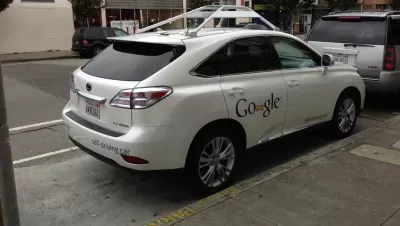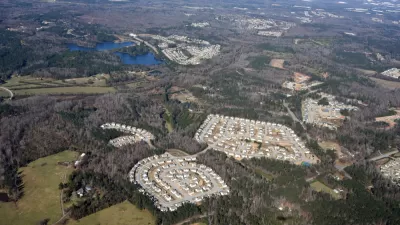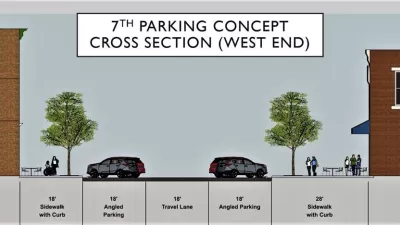Integrating autonomous vehicles into cities will require effectively managing city streets and suburban sprawl.

In an excerpt from his new book Walkable City Rules: 101 Steps to Making Better Places, Jeff Speck considers the future of autonomous vehicles and their place in the urban landscape.
Speck argues that while advocates of AVs outline a multitude of potential benefits, an alternative take is less positive:
History would suggest that the widely held vision of swarming public fleets, uninterrupted by private and non-autonomous cars, is unlikely to happen in the United States, where no city has ever shown the willingness to limit private car use in any meaningful way, despite crippling traffic.
Speck says AVs on American roads will result in more car travel, not less. As a result, the focus for cities should be on regulating roadways. “In an AV future, each city street would ideally be allocated a limited number of driving lanes, no more than currently present. Only in this way will our downtowns remain welcoming to more than just cars,” says Speck.
In addition, AVs will encourage travel over longer distances and so cities must work to contain the suburban sprawl that this travel will encourage. Cities also need to strategically manage the relationship between AVs and transit, says Speck. The significantly higher capacity of transit vehicles means that urban mobility in cities grappling with congestion would be hampered if transit is swapped out for low-capacity AVs.
FULL STORY: Walkable City Rules: Don’t Expand City Streets for Self-Driving Cars

Maui's Vacation Rental Debate Turns Ugly
Verbal attacks, misinformation campaigns and fistfights plague a high-stakes debate to convert thousands of vacation rentals into long-term housing.

Planetizen Federal Action Tracker
A weekly monitor of how Trump’s orders and actions are impacting planners and planning in America.

In Urban Planning, AI Prompting Could be the New Design Thinking
Creativity has long been key to great urban design. What if we see AI as our new creative partner?

King County Supportive Housing Program Offers Hope for Unhoused Residents
The county is taking a ‘Housing First’ approach that prioritizes getting people into housing, then offering wraparound supportive services.

Researchers Use AI to Get Clearer Picture of US Housing
Analysts are using artificial intelligence to supercharge their research by allowing them to comb through data faster. Though these AI tools can be error prone, they save time and housing researchers are optimistic about the future.

Making Shared Micromobility More Inclusive
Cities and shared mobility system operators can do more to include people with disabilities in planning and operations, per a new report.
Urban Design for Planners 1: Software Tools
This six-course series explores essential urban design concepts using open source software and equips planners with the tools they need to participate fully in the urban design process.
Planning for Universal Design
Learn the tools for implementing Universal Design in planning regulations.
planning NEXT
Appalachian Highlands Housing Partners
Mpact (founded as Rail~Volution)
City of Camden Redevelopment Agency
City of Astoria
City of Portland
City of Laramie





























